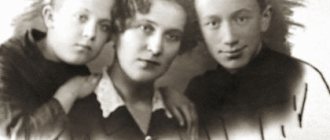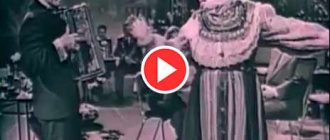Childhood
Lydia Smirnova, whose biography will be described in this article, was born in Tobolsk in 1915. The mother of the future actress died when the girl was barely 4 years old. This event was preceded by another tragedy: Lida's 9-month-old brother fell on the stone floor and hit his head, which led to the boy's death. The mother could not survive this and went crazy and then died. Then Lydia Smirnova lost her father. When the civil war began, he went to the front and fought on the side of the whites. The girl remained in the care of Peter (father's brother) and his wife Marusya. Then the news came about the death of her father, and Lida was left an orphan. This is how she herself recalls those events: “I only found out that I was step-native after graduating from school. The uncle and aunt had two children. Peter worked as an accountant, and Marusya kept house and raised us. Then we moved to Moscow, but life in this city turned out to be difficult.”
Personal life of the artist
The talented domestic film actress had behind her not only a rich creative baggage, but also many romantic stories. Her attractive appearance and insatiable thirst for life allowed her to have not only a lot of fans associated with her professional activities, but also many suitors, among whom, during the premarital period, we can note the composer Isaac Dunaevsky and the captain of the Kuban steamship Valery Ushakov.
And then there was a short marriage with journalist Sergei Dobrushin, who volunteered to go to the front and disappeared without a trace. After a long courtship, Lydia Smirnova’s second husband was cameraman Vladimir Rapoport. From 1975 until her death, the artist remained in the status of a widow. However, the entire “film fraternity” spoke about her stormy romances with directors Lev Rudnik and Mikhail Kalatozov, as well as cameraman Konstantin Voinov.
Since the artist did not have any offspring during her life, her interests, in addition to family life, included travel. So, Lydia Smirnova managed to visit twenty-eight countries. In addition, she was interested in classical music and ballet. It is noteworthy that her best friend was Faina Ranevskaya, who lived in the next entrance and was a frequent guest in her house.
Youth
At school, Lydia Smirnova did not study very diligently. Her inappropriate behavior was constantly discussed by teachers. One day a girl was playing with the kids in class and accidentally threw a stool out the window. It fell on the head of a man passing by. The injury was serious, and a passerby reported to the police. A pedagogical council was urgently convened, at which they decided to expel Lida from school. However, this decision was subsequently canceled, and the girl remained at school. After graduating from seven classes, the future actress decided to enter a technical school, and after graduation she became a laboratory assistant at the Aviation Industry Administration. In the evenings, Lida attended lectures at the Aviation Institute. She could not enroll as a full-time student due to lack of funds.
Passion for theater
Despite her natural talents and flexibility, the girl did not even dream of becoming an actress. After graduating from college, she went to work in distribution at the Main Directorate of the Aviation Industry. In parallel with this, Smirnova continued her studies at the evening department of the Moscow Aviation Institute.
The desire to become an actress was instilled in the girl by her then boyfriend. He was the head of the department and loved the theater. Together with Lydia, they often went to performances, and then she became imbued with this type of art. The student dropped out of the aviation institute, then applied to all theater universities in Moscow. She managed to enter the Vakhtangov School, the All-Union Institute of Cinematography and the Chamber Theater School. The last institution was closest to her home, so Lida decided to study there.
In 1939, the girl graduated from drama school. Thanks to her hard work and acting talent, she received an invitation from Alexander Yakovlevich Tairov. The director took only two people into the troupe, and Lida became one of them. But at the Chamber Theater she managed to play only one role in the production of “The Aristocrats”. After the premiere, the troupe went on tour, and Smirnova finally made a choice in favor of cinema.
Adulthood
In 1932, Lydia Smirnova, whose biography is known to all fans of her work, leaves home. The reason for this was a seemingly trifle - the future actress dropped a jar of millet on the floor. Seeing this, the aunt attacked Lida with her fists, and the girl’s patience was overflowing. The next day, she told her boss about the situation. He went to meet Lydia: he gave orders to give her three hundred rubles and secured a small room for Smirnova. Thus began her adult life.
Theater university
Unexpectedly for everyone, Lydia Smirnova, whose biography can serve as an example to follow, left the 2nd year of the aviation institute and applied to three theater universities: the Vakhtangov School, VGIK and the studio school at the Chamber Theater. She was accepted everywhere, but Smirnova chose the latter option because of its proximity to home. The school was headed by Alexander Tairov. When Lida finished her studies, he offered her a place in his theater. It should be noted that only two students from the entire course received such an invitation. The chamber theater was very popular at that time, and Smirnova was offered the leading role in the film “My Love.” And Lydia chose cinema. In the theater, the girl managed to play only in the play “Aristocrats”. After that, Kamerny went on tour, and Lydia Smirnova, whose photos are here, began her acting career.
Student youth
Despite her obvious creative abilities, Smirnova chose a specialty far from art: she entered the Industrial and Economic College and successfully graduated from it. Following the direction of the educational institution, Lida got a job at the Main Directorate of Aviation Industry, and later entered the Moscow Aviation Institute, where she studied two courses.
Lydia's life could have become similar to the biographies of millions of her compatriots, but her young man was a keen theatergoer. It was he who instilled in his girlfriend a love of theater. And His Majesty Chance intervened: one day Lida was stopped on the street and informed about enrollment in a theater school. And she submitted documents to all theater educational institutions in Moscow.
We recommend: Svetlana Druzhinina: biography and personal life
Imagine the girl’s surprise when it turned out that they were ready to accept her everywhere! Then Lida left the aviation institute and became a student at the theater studio school. That’s when the biography, and the entire subsequent life path of Lydia Smirnova, became completely different from everyone else’s.
Possessing a cheerful and cheerful disposition, Lydia immediately proved herself to be the soul of the group. Film studios often came to the drama school to select students. The blue-eyed blonde Lidochka was chosen almost all the time, but for some reason her screen tests were always unsuccessful.
1939 was the year of graduation for Lidochka Smirnova. Having received her diploma, the talented and hardworking actress joined the troupe of A.Ya. Tairova. But, as it turned out, theater was not her calling. On stage, Smirnova played the only role, and when the troupe went on tour, Lida stayed, as she agreed to a role in the musical “My Love,” which made her famous throughout the country and brought her the sincere love of the audience.
Carier start
“Nastenka Ustinova” is the first film in which the actress played a cameo role in 1934. Lida’s real career began with the film “My Love.” After the film was released, the charming Shurochka fell into the hearts and minds of a large number of viewers. We can say that the actress played herself. Shurochka, like Lida, was full of optimism, energy and faith in a bright future. After the premiere of the film, Smirnova recalled: “It was the happiest day. In Leningrad and Moscow my portraits hung everywhere. Songs written for the film by Dunaevsky could be heard from the courtyards. People recognized me on the street and called me Shurochka, not Lida. They took autographs and wrote a lot of letters.” Lydia Smirnova, whose personal life underwent changes at that time, was happy. She began a romantic relationship with the composer of the film, Isaac Dunaevsky. The lovers met in Isaac's three-room suite at the Moscow Hotel. This continued throughout the entire filming period, which lasted several months. Then Lydia had an abortion. Unfortunately, after this the girl was no longer able to get pregnant. Therefore, we inform those fans of the actress’s work who are looking for information on the topic “Lydia Smirnova, children” - she did not have any.
New hobby
At the beginning of 1940, the actress went to Yalta to film the film “An Incident in the Volcano.” Every day Dunaevsky sent telegrams and letters to Lydia. And while Isaac was missing her, Smirnova developed a new hobby. She fell in love with Valery Ushakov, who held the position of captain on the ship "Kuban". Their dates took place in strict secrecy and were kept secret from Evgeniy Schneider (the director of the film). Only a few actors knew about this novel, and they helped the lovers. However, one day people from the inspection commission came to Lydia’s room without warning, and Ushakov had to climb down from the window on tied sheets. Dunaevsky continued to yearn for Smirnova and send her telegrams, and after the actress returned, he offered her his hand and heart. Lydia refused.
The war years and the death of a spouse
When the war began, Sergei Dobrushin (the actress’s husband) went to the front. Meanwhile, Lydia Smirnova, whose filmography includes more than a dozen films, lived in Moscow and was busy filming combat film collections. At night she extinguished incendiary bombs. After a while, thanks to her fame, she managed to come to her husband at the front and spend 3 days with him. Soon Sergei died near Smolensk. The actress was shocked by the death of her husband. Her place of work, the Mosfilm film studio, was evacuated to Alma-Ata. There, Vladimir Rapoport (cameraman) and Friedrich Ermler (director) began to seek Lydia’s favor. The actresses had to starve. One day, when Lydia Smirnova and Vera Maretskaya were sitting in the same room, Ermler came to them. He brought 2 boiled eggs and a smokehouse. Rapoport came next and gave out 30 eggs from his ration. Maretskaya said: “And you still think? Friedrich will carry 2 eggs all the time, and Vladimir will give everything he has!”
Wartime and personal life of Lydia Smirnova
The success that accompanied the actress after her role in the film “My Love” was absolutely deserved.
But the Great Patriotic War began. Many directors, artists, actors and cameramen went to the front. Lydia Smirnova did not leave the screens for several decades. Lydia’s husband, journalist Sergei Dobrushin, did not wait for the summons, went to the recruiting station as a volunteer and just a month later died heroically near Smolensk. The second husband of the actress was cinematographer Vladimir Rapoport (1907-1975). The fate of the few screen idols of that time developed differently. Some stopped acting, some went to the front, some could not withstand all the hardships and sorrows of wartime.
Lydia Smirnova was a little luckier. She did not stop working, playing with such great actors as Pyotr Aleinikov, Nikolai Kryuchkov, Vera Maretskaya, Mikhail Zharov. She will forever remain in the viewer’s memory as a symbol of that difficult era.
Illness and new marriage
In Alma-Ata, Lydia Smirnova (theater and film actress) almost died of typhus. When she began to recover, Rapoport surrounded her with care and attention: he took her to the mountains and confessed his love. Years later, Lydia recalled: “So many people looked after me, tried to achieve reciprocity, and only one really cared, understanding how defenseless and lonely I was.” Soon the actress married him and lived with Vladimir until his death in 1975.
Wartime films
The war period was very fruitful in Smirnova’s creative career. The theme of trials in wartime, female heroism, the irreplaceability of losses and the resilience in the performance of its heroines appealed to all Soviet film lovers. In 1941, two films with her participation were released: “Two Friends” and “We are Waiting for You with Victory.” And in 1942, she received a key role in the film “The Guy from Our Town.” In 1943, three more films appeared: “Native Shores,” “Missing in Action” and “She Defends the Motherland.” “Naval Battalion” is another military film from 1944, in which Lidiya Smirnova managed to star. The actress looked great in it.
Brief biography and filmography of Lydia Smirnova
The future famous artist was born on February 13, 1915 in Menzelinsk (Tatarstan) into an intelligent family. Lida's father died in the civil war, fighting for the Motherland on the side of Kolchak, and her mother, after a mental breakdown associated with the loss of her husband and youngest son, soon also died. Therefore, the girl was raised by her own uncle, who took her to Tobolsk, and subsequently to Moscow.
It was here that a favorable basis for an artistic career was laid, as Smirnova began to attend the choreographic school at the Bolshoi Theater. However, Lydia did not appear on the country’s screens right away, having graduated from high school first from an industrial and economic college, and then from a year and a half of an aviation institute. It was while studying to become an aircraft designer that fate played a fatal role with her when, quite by chance, on the street Lydia saw an advertisement for recruitment to a theater school.
And then there was a studio at the Chamber Theater, which, after receiving a theater education, became her home. Lidia Smirnova also participated in many productions on other capital stages. However, the country learned about the rising star only after she became a film actress. In 1938, she played a cameo role in the comedy film “New Moscow,” where she gained her first invaluable experience of working with a movie camera.
Currently, the filmography of the Soviet and Russian film star is filled with many titular film projects, among which the following should be especially highlighted: “My Love” (1940), “We are waiting for you with victory” (1941), “A guy from our city” (1942), “ Silver Dust" (1953), "Three Came Out of the Forest" (1958), "The Marriage of Balzaminov" (1964), "Welcome, or No Trespassing" (1964), "Village Detective" (1968), "I Believe in Love "(1986), "Heiress" (2001-2005).
Lidia Nikolaevna spent the last years of her life very actively, acting in films and being engaged in social activities as a member of the Union of Cinematographers of Russia. She passed away on July 25, 2007, at the ninety-third year of her life, while relaxing in the Zelenograd sanatorium “Nikolsky Park”.
Post-war years
After the war, Lydia continues to regularly appear in films in the role of heroic women. In addition, she was not alien to character roles, in particular negative ones. For example, in 1953 she played the prostitute Flossie Bate in the film Silver Dust. I would also like to talk about Lydia Smirnova, filmed in 1957. The role of Nastya the Bug became one of the actress’s favorites. In 1964, she got the role of a matchmaker in the famous “The Marriage of Balzaminov.” In the same year, Lydia played a doctor in “Welcome” and a saleswoman Duska in a series of films about Aniskin. An interesting fact is that in the early 1950s, when cinema was going through a crisis, Smirnova wanted to change her profession, and even began to master the position of chairman of a collective farm. However, the love for cinema turned out to be stronger.
New novels and new role
In 1953, while filming in Kislovodsk, the actress fell in love with director Mikhail Kalatozov. He offered her a role in his film “True Friends.” Lydia refused to act, and Liliya Gritsenko took her place. The actress’s refusal did not affect her relationship with the director, and they continued to meet. Kalatozov fell madly in love, and even suggested that Smirnova legalize the relationship by leaving for Georgia after that. However, another man appeared in Lydia’s life - director Konstantin Voynov. It was he who offered the actress a key role in his film “Sisters”. Their romance lasted almost 40 years. However, this did not stop the actress from starting new relationships. Smirnova's next chosen one was director Lev Rudnik. This was Smirnova’s most tumultuous romance, which became known far beyond the boundaries of the acting community. Because of this, Rudnik was expelled from the CPSU. Meanwhile, Voinov gave the actress the opportunity to work in a role that was new to her, and Smirnova began playing older heroines. In her book, Lydia Nikolaevna wrote: “I loved Konstantin very much, but I had a husband (unofficial marriage) who was waiting at home. I had to rent a room and live a double life. Voinov left his wife and daughter for me, and I betrayed him, saying that I could not leave my terminally ill husband. Rapoport was in the oncology center with stomach cancer. The doctors gave meds and carried out radiation sessions, but in the end they discharged me because they couldn’t help me with anything else.”
"Late love"
Author: Irina Kravchenko
This is what Lidia Smirnova herself called her romance with director Konstantin Voinov. Their relationship turned out to be strong, standing the test of time and difficulties. How did it happen?
Lidia Smirnova
He was about forty, she was a little over. Everything revolved around the notorious life milestone. When he approached him, he was already worn out and battered by life: he studied in Khmelev’s studio, played on stage and in films, staged plays and made films - but he also became an exile when, after a production that Stalin did not like, he was left out of work. It’s good that he didn’t go to the prison camp, but got a job in a small theater near Moscow, but he lived away from family and friends and only made it to the capital occasionally. The exile shook his self-confidence, but he did not lose his temperament, drive, or imagination in the profession, which is what won her over. She, a star of the 30s and 40s, was still beautiful: eyes, smile, dimples, enthusiasm and femininity... Incendiary, ringing, like a tightly stretched string. Soviet Hollywood. This, however, happened in the second half of the 50s, when the time of great, life-affirming cinema had passed. But she remained and was in her prime.
They met when Voinov was looking for an actress to play the main role in his film “Sisters”. They advised him to Smirnov, but he did not know him, because at that time he understood more about the life of theater than cinema. And she also scolded his performance, staged at the Film Actor’s Studio Theater, which everyone liked except her. But he invited Smirnova to the film. She achieved the next role with him herself: Voinov invited another actress to appear in the film “Three Came Out of the Forest,” but Lydia Nikolaevna insisted on auditioning, and as a result, she was approved.
Konstantin Voinov
It was then in her life, according to Smirnova, that the “pre-war era” ended and a new one, still unknown, but tempting, began. What could be worse for an actress than to outlive herself? This could well have happened to Smirnova, as with many divas of her generation and role. At the very beginning of her friendship with Voinov, Mikhail Romm once told him that he should stay away from Lida as a woman, saying that she was frivolous and would ruin his life. Voinov did not listen. I felt something. Already when I started filming her in my first film, such depths were revealed... And above all in “The Marriage of Balzaminov,” where she played a matchmaker.
What is this movie about, by the way? Mishenka Balzaminov dreams of happiness with all his might, but does not know how to get it, and the life of this lyrical dreamer bestows: to those who cannot earn happiness, it is given for nothing. However, not for that: Mishenka dreams colorfully, enthusiastically, with sincere faith in her future happiness. It is by faith that he is rewarded. The film turned out to be bright, not aging at all, one of the best in Soviet cinema, and in such works the artist, no matter what he “narrates”, says a lot about himself. Voinov probably also uncontrollably wanted to be gifted with life. However, the difference with his character is that Konstantin Naumovich cherished his fortune in every possible way: he worked a lot, and precisely in the field where he could get the coveted harvest. But love, and he had love, how could it be a reward? Despite all Voinov’s efforts, happiness descended on him just like it did on Balzaminov.
Dance in the square
Vladimir Voinovich:
“Konstantin Naumovich was supposed to make a film based on my story.
True, nothing came of our idea, but we met and became friends. Voinov came to see me when I was writing the script for that story, and one day, while he was sitting with me, the phone rang. The woman, whose voice seemed familiar to me, said something like this: “I am a close friend of Konstantin Naumovich. I’ll say right away that I’m old, I’m forty-six years old. I’m very worried about him: keep in mind that drinking is dangerous for him.” After hanging up, I looked at Voinov in bewilderment: “Your friend called.” He answered cheerfully: “Oh, this is Lidka.”
On the set of the film “Three Came Out of the Woods”
By that time, “Lidka” had already become firmly established in his life... connected with a completely different one - actress Olga Nikolaeva, who played at the Ermolova Theater. They had a daughter, Elena. Those who knew her speak of Nikolaeva as an amazing person: kind, delicate, gentle. But what she didn’t have was practical acumen, the ability to manage life. She would hardly call someone asking them not to have a feast with her husband. Voinov, huge, talented, charming, in his work was not inferior to either the actors - he filmed takes until he achieved the desired result - or to artistic advice, in ordinary life he could wilt.
Vladimir Voinovich:
“The second time we started working together was when he was going to make a picture based on my story.
But Lenfilm already had the right to film, and the two of us went there to persuade them to give the script to Konstantin Naumovich. They were persuaded. To celebrate, we went to the hotel restaurant and had a drink. Voinov ordered two more bottles of cognac to take to his room. In the middle of the night I woke up and saw him sitting on the bed and drinking cognac straight from the bottle - he would take a sip, doze off, wake up and mutter something... I listened: “No, guys, I’m still a good director.” Konstantin Naumovich, modest, touching, while drunk, began, as usual, to quote “Vasily Terkin” by Tvardovsky: “No, guys, I’m not proud...” So the night passed, the next morning Voinov’s wife, Olga Vladimirovna, called. She was a very kind woman, but indecisive, timid, and did not know what to do with the drunken Konstantin Naumovich. Lydia Nikolaevna also called. She said in a decisive tone that we needed to lock him in the room, leaving him only half a bottle, and gave him the phone number of a good drug addiction specialist, who soon arrived.” This means that Voinov was not too confident in himself, in his abilities, even where he had every right to be, if, after drinking, he assured someone that he was a “good director,” and immediately reminded that he was “not proud.”
Vladimir Voinovich:
“He was beaten by life, tried not to enter into conflicts with his superiors.
But when I, already in disgrace thanks to my dissent, wrote a script about Chonkin and came with it to the editor-in-chief of the creative association, Konstantin Naumovich supported me. The editor told me that no one would make a film based on my script. Then I replied that there is such a person. He said: “Open the door to the corridor.” She opened it and Voinov was sitting there. The editor asked if it was true that he agreed to direct the film, Konstantin Naumovich answered yes. And he didn’t break off relations with me until my departure from the Union.”
On the set of the film “Balzaminov’s Marriage”
In Voinov this coexisted - fearlessness and indecision. But his very addiction to drinking testified to his inner instability. He needed a woman who would support his spirit that swayed from time to time. Boris Pasternak, for example, had the same “leader,” and at some point she pulled him out of a state of almost insanity: she was simply there, caring and understanding. It is interesting that both Smirnova and Pasternak’s wife Zinaida, initially beauties, acquired one feature with age: instilling in men faith in their masculine powers. And this is worth a lot. Having this, you can tell a stranger on the phone that you are forty-six years old.
So Voinov acquired something like wings behind his back; in any case, he could fly, throwing up the tails of his jacket. No wonder he came up with the dance for Balzaminov, which he, happy, performs at the end of the film. Konstantin Naumovich himself showed Georgy Vitsin how to play this scene: in the summer heat, a large, plump man, unbuttoning his shirt, danced in ecstasy in front of the actor and the entire film crew on the square. He danced as only a happy person can dance.
"How my heart is pounding..."
If at first Smirnova did not take her affair with Voinov too seriously, she soon could no longer imagine life without Konstantin Naumovich, and was even jealous of his wife.
“This has never happened to me before,” she recalled in her autobiographical book “My Love.” “They lived then on the first floor of a house on Karetny Ryad. I arrived by taxi, parked the car around the corner, placed two bricks at their bedroom window and peeked through the curtain flaps. If the curtain was tightly closed, I walked through the snowdrifts into the alley where the other bedroom window looked out, and tried to peep there. Once my jealousy got so raging that I literally climbed my head into the window. The lights were off, they were in bed and talking about me. The rain was pouring down my collar, but I couldn’t tear myself away from the window. They should have heard my heart beating..."
This was Lydia Smirnova at the time she met Voinov. 1958
Vladimir Voinovich:
“He and Lydia Nikolaevna had a touching relationship. They, for example, were on “you” because at first they hid their affair from others and did not switch to “you” so as not to accidentally give themselves away, and then they got used to addressing each other that way. Behind his back, Voinov could call his beloved “Lidka,” and often told her “Lidiya Nikolaevna.” Konstantin Naumovich loved her very much, but sometimes he laughed at his feelings for her. If she annoyed him, he might do something unexpected. I remember we went south by car, Smirnova was driving. Voinov was sitting behind her. He got angry with her for something and suddenly covered her eyes with his hands for a second. She was indignant, but usually laughed at his antics. If he flared up, she calmed down, and then turned everything into a joke.
Lidia Nikolaevna was very Soviet, a party member, a deputy, and Konstantin Naumovich was not at all Soviet. He called her “a product of the era” and joked about her socialist views. And gradually she became imbued with his ideas. When Voinov came to me, who was already out of favor with the authorities, Smirnova was with him. Once she even bothered for me. Although, I’m sure, she was driven by her constant desire to help people: they could approach their favorite artist right on the street and complain about something, and then she would take action.”
Probably, she also had a mixture of admiration for Voinov, gratitude, and pity akin to a mother’s, a natural desire to take care of him. And all this was called love. Just like the fact that he directed Smirnova in seven films is a lot for any actress, and he clearly staged one of them, “Dacha,” for her, did something akin to her benefit performance.
But how could Lydia Nikolaevna tell her husband, cameraman Vladimir Rapoport, about the flaring up of feelings, who was for her, in her own words, “mother, father, grandmother, grandfather, and husband”? It was completely unclear what to do, although this was not the first time such a situation had arisen in her life.
Once upon a time, even before the war, during the filming of her first film, “My Love,” she met composer Isaac Dunaevsky, who lost his head over her. Love began, romantic, flying in full sail. “Come on, sing us a song, merry wind” - in that spirit, in the spirit of Smirnova herself. Lida ran to him, knocked with a conventional knock, and, letting her in, he rejoiced like a child: “The sun has come!” This completely cinematic, in fact, novel had to be consolidated, transferred “to film,” and Dunaevsky proposed to his beloved to get married. There should have been a close-up here: she froze, pressing her hands to her chest, fear in her eyes. So, the secret will become reality, the fairy tale will become everyday life? And she has a husband, Sergei, whom she cannot leave with all her youth, with all her “frivolity.” The duty for her, a beauty and a charmer, was already irrevocable even then. With a sense of duty, the “cinema” and fantasy ended and life began with its earthly laws. You never know what you want when there is the word “must”? Did Lidochka know this from birth or was she taught by the aunt who raised her, who beat her with rods for small offenses and kicked her out of the house for big ones?
Be that as it may, Smirnova knew: you can’t just destroy a family, because love has broken out. Lida probably loved Dunaevsky less than her Seryozha, but how many women would be seduced by the man’s fame, wealth and talent! But she doesn’t. She told Isaac Osipovich that she would like to leave everything as it is. The “love story” ended there, but love still made itself felt. Little things. For example, the melody from “My Love” and hands placed on Lida’s shoulders sounded in a small restaurant in Jurmala, as soon as Smirnova entered there. It was Dunaevsky, who quietly, but somewhat passionately, told her that he had asked to play...
She did not go to Dunaevsky. And now, when Voinov invited her to reveal everything to their halves, she didn’t tell her husband anything. Voinov said about what had developed, not even a love triangle, but an unfortunate square: “We are all good people, and everyone feels bad!” And Lydia Nikolaevna was afraid of making things worse for others. Then Voinov, who could not tolerate lies, came to Rapoport and told him everything. But he couldn’t “solve” anything with his wife - he felt sorry for her, besides, the daughter adored her father, and it was impossible to imagine separation from her. And then Rapoport became seriously ill, and Smirnova, with her characteristic dedication, rushed to get him out.
“I stayed with Rapoport, but our relationship with Konstantin Naumovich did not stop. We just “went deep underground.” It's horrible. After all, love is not only physical intimacy; people want to be visible, have mutual friends, and do not want to hide. And we also had some underground friends.
I remember riding on a tram, looking at passers-by and thinking: “God, how happy they are! Here they are calmly walking together arm in arm, they don’t have to be embarrassed by anyone, they don’t have to hide.” It turned out like this: I live with a man whom I pity, but do not love, and with a man whom I love, but I cannot feel sorry for, show all the feminine qualities of a wife, housewife, friend” (“My Love”).
Vladimir Voinovich:
“She did not leave her husband, but tried to create conditions for family life for Voinov. She and Konstantin Naumovich at one time rented some room or apartment on Pokrovka, Lydia Nikolaevna came there and cooked dinner. We had lunch, then he went home, where his wife was waiting for him, also with lunch. Voinov could not tell her that he had already eaten, and sat down at the table again.”
He could not continue this lie for a long time and nevertheless decided to leave the family, to a communal room behind the Kazansky railway station. Voinov, soft and compassionate, showed character.
“I came into this strange room, with strange smells, with strange broken furniture,” Smirnova wrote in her book, “I prepared dinners, then went back, he made a row, wouldn’t let me go, called me a traitor.
One New Year's Eve I came running to him with delicious food. He was already pretty drunk. I want to get through to his consciousness, caress him, calm him down. I set the clock and we celebrate the New Year two hours before it starts. Then I run headlong back, risking getting hit by a car. My heart is bleeding. I don’t know how it didn’t burst from my monstrous lies and melancholy!
I resort to Rapoport. He also looks at me with pain and reproach. I’m cooking some delicious things again, trying to smile, but I’m not good at it.”
Despite the fact that many condemned Smirnova and advised Rapoport to leave her, he was afraid of losing his Lida. He knew everything - and endured it, even when she left for another filming expedition with Voinov. Whose daughter and wife cried when he left them.
...Remember how “Balzaminov’s Marriage” ends? Mishenka is riding in a carriage with his bride and suddenly begins to sing from an overabundance of joy. What does the bride do? She silently pushes him in the chest with her elbow: calm down. The bride is life itself here, yes, yes, it’s her again. Returns the dreamer from the empyrean to earth: the fairy tale is over, reality begins. Life seemed to ask: “Will you now be able to be satisfied, having received from me what you wanted?”
“There isn’t a day when I don’t think...”
“The addresses changed: now Komsomolskaya Square, now Patriarch’s Ponds. But he is a bad owner, he doesn’t know how to cook, he doesn’t know how to live alone. Previously, they had a domestic worker; as a child, someone always took care of him; he was not adapted to a lonely, bachelor life. And then he took his suitcase and came to the communal apartment... He was not able to understand why I didn’t leave my husband: it means I don’t really love. He believed that by loving, you can survive everything, overcome all difficulties, but I betrayed him. I went on expeditions abroad. And he wanted me not to leave him even for a day. I loved him, but for me filming or traveling abroad was also important.
And he remained alone. I didn't share his love. I rushed about, ran, brought him some lunches, and at that time he suffered because he left his little daughter, whom he loved and who adored him, left Nikolaeva, whom he was used to... I rushed about because I loved him, but at the same time I it was necessary to create peace for Rapoport. I was completely covered in a web of lies, I became more sophisticated, I lied so much! When I went to Voinov, I lied that I was dubbing, and told Voinov that I was going to concerts, and I myself went abroad on a ticket. I often didn’t make ends meet, I was so tired of these lies that I didn’t want anything anymore. There was no happiness, there was some kind of despair, I was sucked into the mud. Rapoport was always at home, waiting for me. I couldn’t go anywhere with Voinov: neither to the theater, nor to the Cinema House, nor to a concert, because everyone would see, and our romance was a secret. And I haven’t been anywhere, I stopped listening to music and going to theaters. All I did was lie. Both love and joy were simply erased. Only despair, only endless explanations” (“My Love”).
“I always stand half a step closer than necessary to a man”
Lidia Smirnova
Once, in her absence - Smirnova went abroad - he started drinking. The owner of the rented apartment called Nikolaeva, and that dove soul came and took her husband, who had almost disintegrated into his component parts. But Rapoport, instead of the two or three years the doctor promised him, lived thirteen. And when he died, Smirnova was left alone. Voinov did not move in with her. Either because he thought she had betrayed him, or he couldn’t leave the family for the second time. More likely, both. He came to visit her and returned to his place. Although he called her several times a day. Lidia Nikolaevna was still aware of all his affairs, participated in his life with the knowledge and even consent of his wife, but there was no more talk of living together. “And I didn’t insist on anything,” she later admitted on the pages of her autobiography. “I quickly got used to my position, I even liked the independence, I was glad that I didn’t have to lie anymore.”
But Voinov fell ill with leukemia. And Smirnova took on the main burden of worries. She looked for doctors, created a cordial atmosphere for him to hold on, even came to his home and cleaned it. I took him to a film festival with a film in which they both played leading roles, “The Comedians’ Shelter.” I built a dacha so he could come there. Konstantin Naumovich came and joyfully commanded where things should be arranged, but at night he moaned, and she heard it through the wall... Seeing how cramped his family lived, she found new housing for them. “He knew how to create, but he couldn’t arrange things, get an apartment, or achieve a title; he couldn’t even buy himself a suit. And for all thirty-seven years I knew this and helped him get a phone number, change an apartment, draw up documents to receive a category or fill out an application form for a trip abroad.” Voinov could not live without her, but she often irritated him. From time to time he reprimanded her over the phone for something and hung up. A few minutes later he called again, having calmed down. She’s used to him being “noisy,” which means life is still seething in him, which means he wants something else from his “Lidka.”
...When he got to the hospital, he kept asking her: “Help me.” One evening he called her and demanded that she come urgently. It was already dark outside, the rain was pouring down, but she still didn’t go. And in the morning he died.
“There isn’t a day when I don’t think about the last days of Konstantin Naumovich,” she later lamented. – In all details, including physiological ones. Before he died, he called me, shouted, demanded that I come. And I betrayed him again, I was afraid of the bad weather... So much time has passed, everything should have dulled by now, but I keep crying and crying..."
“For 37 years I stole my happiness, hid my feelings and suppressed my love!”
Lidia Smirnova
Epilogue
When was Mishenka Balzaminov really happy? Maybe when you dreamed of happiness? And when was the one who made a film about him happy?
Probably, when he was wandering around rented apartments, he was waiting there for her, his beloved.
Happy too, because she ran to him. And they were happy when they bickered on the phone, finding out who loved whom more. And even when she cried about him, gone forever, she was also happy. Because all this is life, the only joy, as both Mishenka and Konstantin Naumovich guessed. photo: Valentin Mastyukov/TASS; Sergey Mishin/MIA “Russia Today”; film concern "Mosfilm"/FOTODOM; Semyon Morgenstern/MIA Rossiya Segodnya
And again a widow
Rapoport was diagnosed in 1962 at the Sklifosovsky Institute, where he was in a general ward with 17 patients. Then Smirnova asked high-ranking colleagues for help, but received no answer. Then Lydia went to the Central Committee of the CPSU, but this did not help either. The officials did not seem to hear her request. Then Lidia Nikolaevna decided to hand over her party card to one of the leaders of the Central Committee. Rapoport was immediately transferred to the CPSU MK hospital. Thanks to the care and efforts of his wife, Vladimir lived for another 13 years and died in June 1975. A year before his death, he gave Smirnova a gift for her 60th birthday - a role in the second film in the series of films about Aniskin.
Lydia recalled: “Vladimir always loved and protected me, like dad or mom. I only brought him troubles, worries and reasons for jealousy. I think he was choosing what he needed more - losing me or being with me and putting up with some restrictions. People around me kept saying that I was a bitch and that I was torturing this holy man. What about the one who had it easier... The one who lives with a loved one or the one who continues to live with an unloved one? However, he was too sick for me to leave him. It would have killed him right away."
Despite everything, actress Lydia Smirnova, whose personal life was very turbulent, continued to actively act in the 70s and 80s. In 1981, her heroine took an exam from Irina Muravyova in the film “Carnival”.









